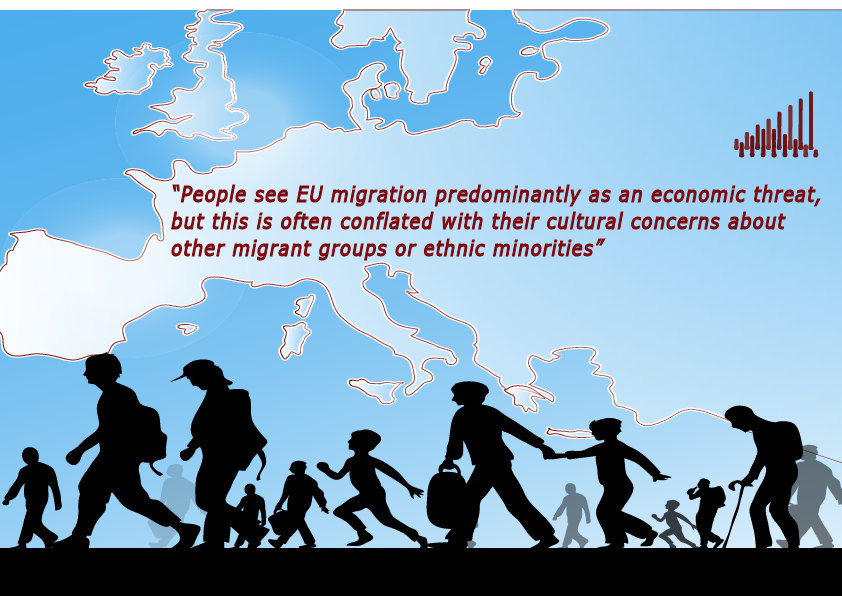People’s perceptions of EU immigration: it’s the economy, stupid!
What factors drive people’s negative views of immigration? Some have argued that anti-immigrant sentiments are driven by cultural concerns about the impact on our national identity and our traditional ‘way of life’ which is perceived to be threatened by the influx of foreigners with different cultural values and customs. Others focus on how attitudes are driven by economic concerns such as the perceived negative impact on jobs, wages and public services.
 Post Date
Post Date
 Reading Time
Reading Time

What factors drive people’s negative views of immigration? Some have argued that anti-immigrant sentiments are driven by cultural concerns about the impact on our national identity and our traditional ‘way of life’ which is perceived to be threatened by the influx of foreigners with different cultural values and customs. Others focus on how attitudes are driven by economic concerns such as the perceived negative impact on jobs, wages and public services.
This has been debated extensively in the academic literature. NIESR’s recent research on immigration attitudes, carried out with colleagues from Birkbeck, did not set out primarily to answer these questions, yet some of our findings are highly relevant to this on-going debate.
Firstly our findings, based on in-depth focus groups in the Leave voting area of Sittingbourne, Kent, indicate that people’s concerns gravitate strongly around economic considerations and particularly about the impact on jobs, wages and public services. One interpretation of this and other studies, such as the recent one by British Future, is that the economic story is people’s way of presenting their cultural concerns framed as a more acceptable form of objection in a focus group setting. But the people in our focus groups did not shy away from raising their cultural concerns, without prompt, frequently and quite forcefully. Yet even in this very open environment, where all views could be voiced and indeed were voiced, the predominant theme in relation to the impact of EU migration was the focus on migrants’ economic contribution.
Our focus groups made it clear that different immigrant groups are typically associated with different concerns. This observation is in line with a few recent experimental survey studies (here and here) which have found that EU migrants, and particularly Eastern European migrants, are perceived as a threat in economic terms while Muslim migrants and ethnic minorities are perceived as a threat in terms of culture, security and crime. Similarly, our focus group participants’ opposition to EU immigration appeared to focus predominantly on their impact on the economy and public services. When cultural concerns were brought up, this was largely with reference to British ethnic minorities, in particular Muslims.
Our focus group discussions also demonstrated that people constantly conflate different migrant groups, such as economic migrants, asylum seekers and refugees, as well as non-EU and EU migrants. This is not surprising as the term ‘migrant’ is often confused with ethnic minorities and with asylum seekers in the public debate, and particularly the UK media use the terms interchangeably. This makes it extremely hard to make any firm conclusions about people’s attitudes to specific groups of migrants, based on how people report their own preferences. In the focus groups, people had a tendency to readily jump between different types of migrants when discussing the value of EU immigration, and to talk about whatever group was most salient to their views.
Scott Blinder has written brilliantly about people’s ‘imagined immigration’. He argues that survey respondents answer survey questions on the basis of their own (unstated and unknown to the researcher) assumptions about immigration, such as believing that there are many more asylum seekers than there actually is. These beliefs will influence how they respond to questions about perceived impact and policy preferences. Similarly, our focus groups participants often cited cultural concerns in discussions about the value and impact of EU immigration but it was clear that they were actually talking about non-EU migrants, or asylum seekers, or British ethnic minorities. Our advantage in a focus group setting was that we could, in most instances, reasonably infer that their cultural concerns were likely not related to EU migrants if, say, their answers evolved around asylum seekers or Muslims. Unfortunately, a survey analyst is often not equipped with this luxury of being able to accurately interpret people’s imagined immigration.
What does all this mean? Our conclusion is that people see EU migration predominantly as an economic threat, but this is often conflated with their cultural concerns about other migrant groups or ethnic minorities. Of course, the irony is that the economic evidence on whether migrants contribute positively or negatively to the public purse and public services strongly points to the former. This leads us straight to the issue of how people come to hold views about immigration and how they respond to economic evidence, which was one of the main aims of our research. You can read more about this in a blog by my colleague Heather Rolfe, one of the report co-authors, here.
Additional material: “The public’s perception of immigration – what role does the media play?” – Heather Rolfe in conversation with Gary Gibbon of Channel 4 News – listen to our podcast here.
















